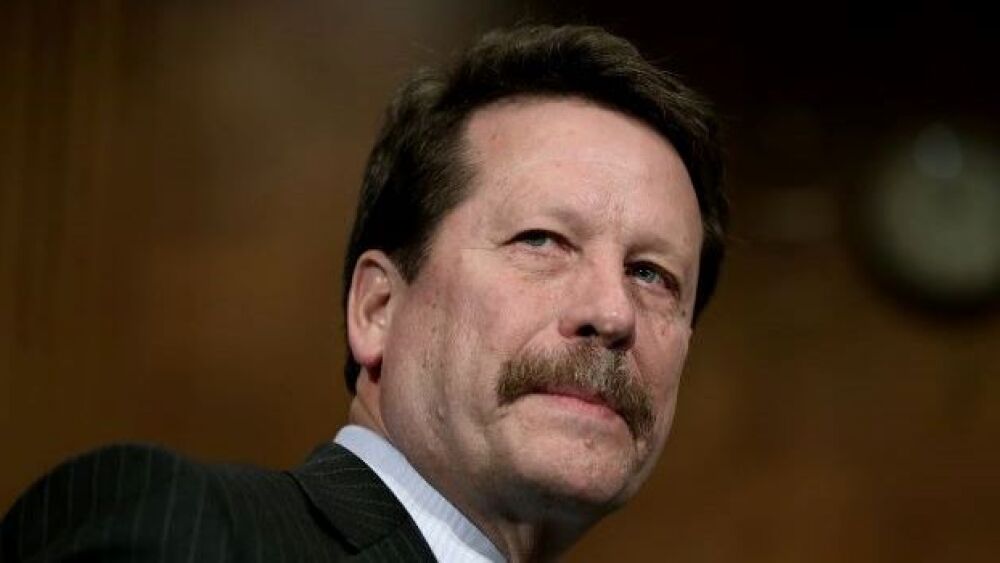The FDA has sprung into action, cracking down on the illegal sales of Adderall, as well as on CBD companies making claims their products are effective treatments or cures for COVID-19.
FDA Commissioner Robert Califf/Win McNamee via Getty Images
The U.S. Food and Drug Administration has sprung into action, cracking down on the illegal sales of Adderall, a drug for attention deficit hyperactivity disorder, as well as on CBD companies making claims their products are effective treatments or cures for COVID-19.
The FDA, along with the U.S. Drug Enforcement Agency, has issued letters to two websites for illegally selling the drug Adderall on their websites without a prescription. The two federal agencies said Adderall has the potential for abuse and addiction. The sale of the medication should be monitored, and treatment should be under the supervision of a physician, the agencies said.
The federal warnings were issued to kubapharm.com and premiumlightsupplier.com. The government said the amphetamine drug products being sold on the websites are misbranded and in violation of the Federal Food, Drug, and Cosmetic Act. Additionally, the websites are in violation of the Ryan Haight Online Pharmacy Act (RHA) by failing to register with the DEA, the government said. The websites have 15 days to respond to the government warning letters.
Robert M. Califf, the newly-appointed commissioner of the FDA, said the illegal online sale of stimulants puts Americans at risk and can contribute to potential overdoses.
“These particular types of online pharmacies also undermine our efforts to help consumers safely purchase legitimate prescription medicines over the internet. FDA will continue partnering with DEA in an effort to safeguard public health and protect consumers who need access to these important medicines,” Califf said in a statement.
The warning letters sent to the two Adderall distributors come on the heels of warning letters the FDA issued to two companies selling cannabis-based products they claimed could be used as a treatment for COVID-19. So far in 2022, the FDA has issued seven warning letters to CBD companies regarding such claims. In an announcement at the end of March, the FDA noted there have been no CBD-based treatments approved for COVID-19.
“The agency is concerned these deceptive and misleading product claims could cause people to delay or stop appropriate medical treatment for COVID-19, leading to serious and life-threatening harm,” the FDA said in its announcement.
Companies that make such false claims can be subject to a civil penalty of up to $46,517 per violation. Additionally, these companies may also be required to pay refunds to consumers, the FDA said.
At the end of March, the FDA, along with the Federal Trade Commission, also issued warning letters to Iodine Products, Inc. and Applied Biological Laboratories Inc. for the sale of unproven COVID-19 treatments.
The FDA also hit Bausch Health with a warning for making misleading statements about its plaque psoriasis lotion Doubrii on a television show. In its warning, which was first reported by RAPS, the FDA raised concerns over false or misleading claims about the safety of Doubrii, particularly in pregnant women. There are also concerns about the topical medication and issues with photosensitivity and the risk of sunburn.
“By omitting serious risks associated with Doubrii and material facts pertaining to serious risks, the video misleadingly suggests that Doubrii is safer than has been demonstrated,” the FDA said in its letter.
Civil penalties can be brutal for companies. This week, a California appeals court upheld a ruling that puts Johnson & Johnson on the hook for $302 million for deceptively marketing pelvic mesh implants for women. The life sciences giant had appealed a 2020 California Superior Court ruling that handed the company a $344 million loss. In the appeal, the court reduced the fees by $42 million, the Associated Press reported.





